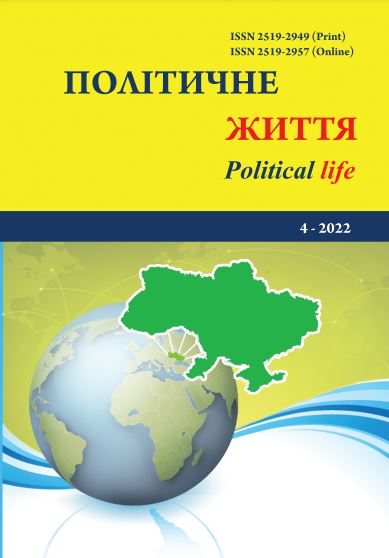The issue of Ukraine in the russian national discourse
DOI:
https://doi.org/10.31558/2519-2949.2022.4.10Keywords:
political discourse; nationalist narrative; Slavophile concept; expansionist politics; Imperialist worldview; Russification process; Primakov doctrine; annexation of historyAbstract
The article refers to the position of Russian nationalists regarding Ukraine, according to which they refuse the idea of Ukrainian independence. They neither consider the state of Ukraine as an independent state nor the Ukrainian people as a separate nation. For years, Russian nationalists have been preparing an ideological basis for the legitimation of their aggressive and imperial foreign policy, the logical continuation of which was the annexation and occupation of the territory of Ukraine by Russia. The study of Russia’s aggressive invasion of Ukraine and the instrumentalization of historical narratives is one of the important topics of the contemporary political agenda, which deserves special attention from scientists and civil society. To scientifically oppose the views of Russian nationalists, the authors of the article analyze the issues of the origin of Russia and "Russians" based on a retrospective analysis of history; the imperial character of the modern geopolitical concept of Slavophile – "Russian World"; The process of Russification in Ukraine – the stages of forbidding the teaching of the Ukrainian language since the seventeenth century and the Russian narratives.
The purpose of our study is to study and fundamentally analyze the Russian imperial nature. Such an integrated approach will help us explain its phenomenon and draw the right conclusions. Ukrainian identity and the idea of Ukrainian statehood are especially unacceptable for the Russian imperialist ideology, they cannot imagine a real, great Russia without Ukrainian lands. It is for this reason that at various times attempts were made to discredit the idea of Ukrainian statehood and called it at the official level various derogatory epithets: Malorossiya, Novorossiya and others.
References
Beridze I. History of Russia and Ukraine: Vladimir Putin. URL: https://indigo.com.ge/articles/rusetisa-da-ukrainis-istoria-vladimer-putin/(Access date: 11.10.2022).
Bichashvili M. Russia One, Russia Two: Society and Politics, (Almanac of Social and Political Studies). Tbilisi: publishing house Caucasian Institute of Peace Democracy and Development, 1996. №1. p. 30-3.
Gozalishvili N. Kartsivadze M. Kalandadze E. Annexation of history – Russian hybrid war and Ukraine . URL: https://idfi.ge/ge/annexation_of_history_russian_hybrid_war_and_ukraine| (Access date: 11.10.2022).
Chkadua g. Russia’s Destiny: Interview: with Louisiana State University Full Professor Aleksandre Mikaberidze. 28.03.2022, URL: https://indigo.com.ge/articles/rusetis-bediscera/ (Access date: 11.10.2022).
Conant I. Russia and Ukraine: an intertwined history that connects and separates them. URL: https://nationalgeographic.ge/ruseti-da-ukraina-gadakhlartuli-istoria-romelic-mat-akavshirebs-da-ashorebs-ertmanetisgan/(Access date: 11.10.2022).
Cuzio T. Ukraine’s struggle for independence and dignity:The fight for freedom: from the baltic to the black ser. Tbilisi: USAID, EECMD, FPRC, 2022. p. 54-55.
Imnaishvili N. Ukraine’s foreign policy course Geopolitical transformation of "Maidan After the Revolution", dissertation: Tbilisi, 2021. p. 59.
Zharin S. Russia is an empire of lies. Journal American purpose: the future of Ukrainian resistance. Tbilisi: Economic Policy Research Center (EPRC), 2022.3 p.19-20.

